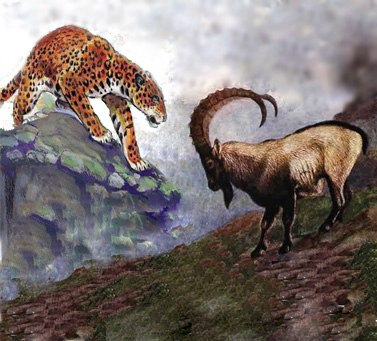
Once upon a time the Bodhisatta was born in a certain village of the Magadha kingdom, in a wealthy family. When he grew up, he renounced desires and adopted the religious life, reaching the perfection of meditation. After dwelling long in the Himālaya, he came to Rājagaha for salt and vinegar, and dwelt in a hut of leaves which he made in a mountain enclosure. Just as in the introductory story, the goatherds drove their goats thither: and in the same way, one day as a single she-goat was going out later than the rest, a panther waited by the door, thinking to eat her. When she saw him, she thought, "My life is forfeit: by some means I must get him into pleasant and kindly talk, and so soften his heart [480] and save my life." Beginning a friendly talk with him from some distance, she spoke the first stanza:—
How fares it with you, uncle? and is it well with you?
My mother sends her kind regards: and I'm your friend so true.
Hearing her, the panther thought, "This baggage would beguile me by calling me "uncle": she does not know how hard I am;" and so he spoke the second stanza:—
You've trod upon my tail, miss goat, and done me injury:
And you think by saying "Uncle" that you can go scot-free.
When she heard him, she said, "O uncle, don't talk in that way," and spoke the third stanza:—
I faced you as I came, good Sir, you face me as you sit:
Your tail is all behind you: how could I tread on it?
He answered, "What do you say, she-goat? is there any place wh ere my tail might not be?" and so he spoke the fourth stanza:—
As far as four great continents with seas and mountains spread,
My tail extends: how could you fail on such a tail to tread?
The she-goat; when she heard this, thought, "This wicked one is not attracted by soft words: I will answer him as an enemy," and so she spoke the fifth stanza:—
Your villain's tail is long, I know, for I had warning fair:
Parents and brothers told me so: but I flew through the air.
Then he said, "I know you came through the air: but as you came, you spoilt my food by your way of coming," and so he spoke the sixth stanza:—
The sight of you, miss goat, on high, the air a-flying through,
Frightened a herd of deer: and so my food was spoilt by you.
Hearing this, the goat in fear of death could bring no other excuse, but cried out, "Uncle, do not commit such cruelty; spare my life." But though she cried out, the other seized her by the shoulder, killed her and ate her.
’Twas thus the she-goat cried for grace: but blood must satisfy
The beast that grips her throat; the bad will shew no courtesy.
Conduct, nor right, nor courtesy, the bad man will display;
He hates the good: to face him then ’tis best in open fray.
These are two stanzas inspired by Perfect Wisdom.
A holy ascetic saw the whole matter of the two animals.
After this lesson, the Master identified the Birth: "At that time the she-goat and the panther were the she-goat and the panther of to-day, the holy ascetic was myself."